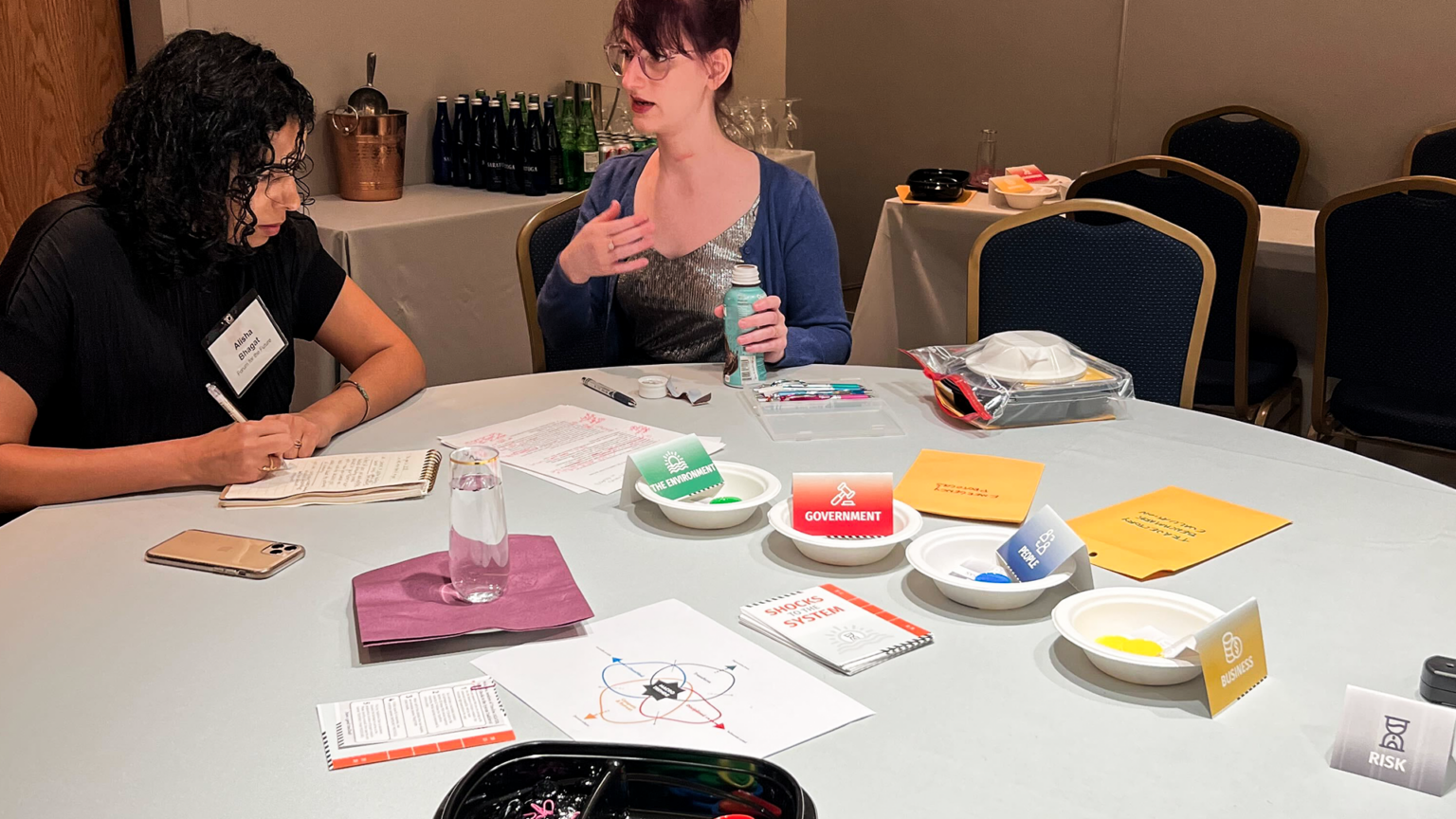Futures Thinking is imperative if we are to shift the mindsets that we have about the future, writes Forum for the Future’s Futures Lead, Alisha Bhagat. This blog is the first part of a blog series on the lessons we have learned in using futures and foresight with civil society organizations and philanthropy over the past couple of years, as well as case studies, process, and impact.
“But it’s important also to take this whole question back out of the realm of quantification, sometimes, to the realm of the human and the social. To ask what it all means, what it’s all for. To consider the axioms we are agreeing to live by. To acknowledge the reality of other people, and of the planet itself. To see other people’s faces. To walk outdoors and look around.” – Kim Stanley Robinson, Ministry for the Future
When I first started working at Forum for the Future over ten years ago, our primary pathway to creating change was partnering with business. Our organization was created out of a need to serve as a “critical friend” to businesses embarking on ambitious sustainability projects. At the time, there were very few organizations that critically partnered with business to shift the way that business leaders thought and how businesses operated. In my time as a futurist at Forum, we have worked hard to embed long term, sustainable thinking, into what are often very short-term strategy cycles that emphasize immediate results.
However, the same problems faced by businesses are also felt by civil society organizations, and NGOs. As I write this, a number of notable events have shifted the global landscape. There is ongoing war in Ukraine and a re-ignited conflict between Israel and Palestine. Pirates disrupt global shipping in the Red Sea. Catastrophic natural disasters including earthquakes and storms have killed tens of thousands. At the same time, polarization continues to be an issue and 2024 is being called the “super election year” as this year, 2 billion people will take to the polls in more than 60 countries.
For both people and organizations, the issues of climate change and polarization, continue to be two of the most pressing issues of our time. Climate change shapes the very world we live in, and polarization has the ability to change how we respond. As changemaking organizations, we are all working to move away from polarization to collectively address just and regenerative solutions to the climate crisis. What makes the role of civil society different, is that, freed from the need to quickly grow and maximize returns, our organizations have the potential to mobilize resources in order to deeply address social and environmental problems, and ideally, an enhanced ability to think long term and with future generations in mind. This makes civil society uniquely poised to address some of the increasingly complex issues the world faces.
Using Futures Thinking as a method of building organisational resilience
Through our recent work with civil society organizations – foundations, philanthropies, and NGOs both international and local – we have experimented with a number of Futures Thinking tools to help anticipate and respond to change, build resilience, create better futures, and deliver on their mission. Futures and foresight offer us a framework to think expansively and inclusively about the future, utilizing methods that can blend established knowledge modalities such as data, with intuition, storytelling, community building, and imagination. By incorporating Futures Thinking internally, into existing ways of working, organizations can strengthen projects and support changemakers. Through using futures in our work, here are five crucial lessons that we’ve learned:
- Purpose-driven organizations cannot pay attention to just one issue anymore. Issues are increasingly interconnected and complex. While we have always known some of these linkages, others are much more uncertain. For example, global conflict – often viewed as a geopolitical issue or a humanitarian one, is deeply connected to climate change. The CO2 emissions from the first 60 days of the Israel-Hamas conflict surpassed the annual emissions of 20 countries identified as highly vulnerable to climate change. These emissions were due to the aerial and ground operations of a military conflict at this scale. Climate change is also a driver of conflict, as it exacerbates multiple other underlying drivers of conflict, such as poverty, poor governance, and tensions over natural resources that are drawn over socio-ethnic lines. The complexity of our current context and its interconnecting systems require us to keep track of everything everywhere, all at once – an impossible task. We are increasingly seeing that organizations can no longer focus on only their core issues, and are setting up horizon scanning functions, or building futures capacity internally, to make sense of the shifting global context.
- The power of Futures Thinking is the ability to shift narratives towards ones that are more hopeful, transformative and realistic. It is difficult to imagine different possible futures when it seems as if our ultimate outcome is predetermined and that we are heading towards a world of intense climate catastrophe and heightened geopolitical conflict. We need to practice imagining potential transformative futures in creative and compelling ways to inspire action, both in our own organizations, and the outside world.
- However, Futures Thinking also helps us to be more ready for the multiple, plausible futures that may occur. We must simultaneously orient ourselves and our human endeavours towards positive futures, whilst also being more ready for what else may play out. Futures Thinking helps with holding the plurality of possibility.
- It is imperative that we work to shift mindsets about the future. As I’ve written about before, our mindsets – the way we think about an issue – informs our ability to act. Our mindsets reflect our worldview and an established set of values, beliefs, attitudes and culture that shape our thinking and guide our actions. They can be one of the most impactful places to intervene in a system, but also one of the most challenging things to shift. One of the ways in which we have used Futures Thinking to shift mindsets, is by working to envision and experience possible outcomes.
- We need more than data. As Kim Stanley Robinson writes, we need to sometimes move out of the quantified into the human and the social. It is often the case that we have enough data on an issue and that additional data is not helping with decision-making. What we need, in addition to the certainty that data brings, is an exploration of the uncertainties that will drive the future shape of that data, or how it manifests in the world. By engaging in a scenarios process or a horizon scanning exercise, organizations are able to explore the ways in which uncertainties could end up manifesting into different futures and thus changing the way we think about, and work towards, a desired future.
Futures and foresight offer us a framework to think expansively and inclusively about the future, utilizing methods that can blend established knowledge modalities such as data, with intuition, storytelling, community building, and imagination. By incorporating Futures Thinking internally, into existing ways of working, organizations can strengthen projects and support changemakers.
What this looks like in practice
An example of this is through the development of the “Shocks to the System” game developed in partnership with Climateworks Foundation. In creating the game we conducted research on a few issues relevant to the Climateworks community – namely minerals for the energy transition, and the volatility in global food prices. We decided to turn this into a game, to test decision-making abilities based on global trends and explore issues within the context of different mindsets about the future.

Shocks to the System in action, 2023
While many sustainability minded non-profits and foundations examine internal power dynamics, there is a need to shift our mindsets around change into ones that are non-linear, inclusive, and regenerative. This can often be messy and emergent. Futures Thinking offers us a place to experiment and check our assumptions in a productive manner by enabling us to imagine the impact of our decisions and how they might play out in the communities we work with.
We have all the data we need; we need to tap into greater creativity and imagination in order to shift mindsets, redesign systems, and create systemic change. For nonprofits, we are often asked for more data, or better data. While data is a useful tool, it is a specific one, and can often be used to mire people in inaction, further confuse people, or create a never-ending need for increasing amounts of it. On many of the topics we work on, we often have enough data, and so do critical decisionmakers. We need to move beyond data and encourage the impetus to act, and to specifically take the level of bold, ambitious, sometimes fringe, actions needed to create change.
Futures and foresight: A key unlock for civil society organizations
Civil society organizations, particularly philanthropies and international NGOs are becoming more interested in embedding futures and foresight tools into their organizations, both for organizational resilience and for the need to think more long term when making decisions. In the words of Edward Villanueva in Decolonizing Wealth:
“The lesson is … more about holding space for others’ brilliance than being the sole source of answers, more about flexible shape-shifting to meet the oncoming challenges than holding fast to a five-year strategic plan.”
In this blog series we will dive deeper into some of the lessons we have learned in using futures and foresight with civil society organizations over the past couple of years, and share case studies, process, and impact. Our hope is that it inspires you to shift the way you think about the future and learn from peer organizations working for change.
Next in the series
- Love, futures and philanthropy: Why giving in a polycrisis needs to start from the heart by Hannah Pathak
- Philanthropy is adopting a new tool for impact: Futures thinking by Ariel Muller
This blog was originally published on Forum for the Future on 9th February 2024.



Join discussion